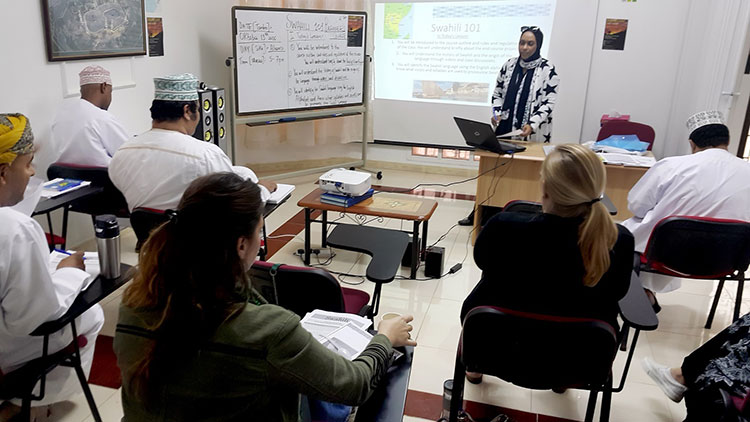When Fatma Salim Riyami of Knowledge Oasis Muscat (KOM) came up with the idea of starting a first of its kind Swahili language school, she found immediate support in her friends Habeina Al Sabtiy, a science teacher, and Nasra Al Adawy, and the programme took off soon after. Loosely titled ‘Kishwahili Kitukuzwe’, meaning ‘Swahili be recognised’, the initiative was formally inaugurated last October at the Holy Quran School in Al Hail, in the presence of Kenyan Ambassador and the Attaché from Tanzanian Embassy.
The first batch of students included an American whose Swahili needed some polishing, a Turkish woman who was interested in the language, a Jordanian beginner and a Zanzibari Omani whose Swahili was not as good as her English, in addition to four Omani men who quickly grasped the nuances of the language.
The school has since grown in size and student strength, and the classes are conducted every Mondays and Thursdays at 5pm, at National Business Centre, which is located in K-4 building in KOM campus in Al Khoudh.

For the uninitiated, Swahili is a Bantu language – Lingua Franca of African Great region and other parts of East and South-East Africa. Five million people speak it as native language and further 135 million as second. The language in question can be both written in Latin and Arabic script, respectively, and is very easy to learn. Actually, the word Swahili comes from the Arabic phrase meaning ‘of the coast’, and therefore the native speakers are known as ‘Waswahili’ and the language is called Kiswahili.
Around 1 A.D. Arab merchants settled around the East Coast and, along with their hosts Bantu Africans, formed the Swahili civilization. In 1711, letters from Kilwa sent to the Portuguese are believed to be the very first documents in Swahili Language that are now being archived in Goa, India. Kiswahili is a combination of Bantu (African dialect) with Persian, Arabic, Portuguese, Hindi and limited words of English, such as Mepu, Jographia, Urusi – meaning map, geography and Russia.
Swahili speakers boast that the language is being taught at Harvard University, Yale, Stanford, Princeton… as well as in Canada, Germany, Poland and Pakistan. Swahili service can be heard on BBC, Voice of America, Voice of Germany, Moscow, Iran, Japan and Egypt to name a few. In 1999, the pilgrimage in Mecca had been broadcast in Swahili and could be heard across the Globe.
An Omani national by birth, Dr. Sharifa Mohamed Zawawi, who migrated to Zanzibar and completed her education there, before moving to New York and taking up a job as a professor of classical languages, is a renowned author of many books.
